|
Fusion 14 Sit On Top Canoe |
|
| Design by Chris Ostlind- Salt
Lake City, Utah - USA |
FUSION 14 SPCIFICATIONS |
|
|
|
LOA |
- |
14’ |
BOA |
- |
30” |
Bow Height |
- |
15” |
Freeboard at design waterline
|
- |
7.5” |
Displacement |
- |
315 lbs. |
Weight |
- |
50 lbs. |
I’ve been designing boats for the last five
or six years now, focusing my attention on canoes,
kayaks
and multihull
sailing craft. I’ve also done the
odd, outboard powered design
and a few monohull
sailboats to fill-out my portfolio with
some balance. You may have even seen a few of my more
esoteric designs that are meant
to provide a little levity in the design world of
boats.
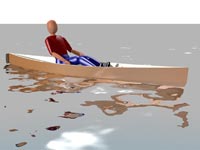 |
Fusion
is a first in the world of buildable plans
(as far as I know) in that it is a Sit-On-Top
Canoe and not a kayak at all.
(click
images to enlarge) |
|
I had never brought any attention to the absolutley
raging, Sit-On-Top (SOT), design world before. So,
for the past several months I’ve been looking
at the commercial offerings from what seems like a
hundred different manufacturers to get a feel for
the important parameters in the style before tossing
my own hat in the ring with a few new SOT boats for
homebuilders.
I’ve now done three new SOT kayaks that will
be nice additions to my design portfolio. The boat
I want to share with you in this article is kind of
a first in the world of buildable plans (as far as
I know) in that it is a Sit-On-Top Canoe and not a
kayak at all.
Now, I may be splitting some fairly fine hairs here
with that claim, but this boat has all the typical
styling cues of a canoe and it is strikingly different
from the SOT kayaks I have seen. Let me explain.
| This boat
has all the typical styling cues of a canoe
and it is strikingly different from the
SOT kayaks I have seen. |
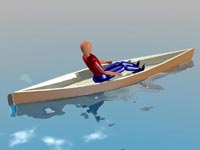
|
|
The significant elements that I feel are incorporated
in all Sit-On-Top designs are as follows:
- 1) An interior volume that provides for flotation
as an integral part of the form.
- 2) A capacity for passive self-draining to keep
the boat afloat even when it has been swamped.
- 3) A profound recreational utility that spans
several sporting disciplines.
- 4) A strong capability for car topping.
- 5) The owner won’t feel trapped if the
boat capsizes.
- 6) The average person can get back in/on the
boat easily when dumped.
The hull of the Fusion 14 is very canoe like in its
appearance with distinct bow and stern stems and an
internal volume that is very canoe-like for its length.
I have included the typical, above the waterline,
deck surface of the everyday, SOT kayak, along with
a self-draining function designed to keep the boat
dry in the funkiest of wave conditions. But, I also
have the nicely shaped walls rising to form an internal
hull form such as you see on the everyday canoe. An
SOT kayak is basically a big flat surface form with
butt and footwells in the center of the hull. A storage
well aft for the gear being used while on the water
is also a normal design element.
Build style is in marine plywood, glassed in epoxy
in an S&G technique. All the exterior surfaces
showing will be fully glassed. The seams inside the
hull and deck surface are to be glassed with tape
and epoxy. The bulkheads are taped and filleted to
the hull surface.
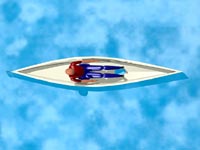 |
Build
style is in marine plywood, glassed in
epoxy in an S&G technique.
|
|
The Fusion 14 has two-inch thick, hollow sidewalls
on all vertical surfaces and a raised deck that sits
four inches above the hull bottom. The boat is equipped
with a trunk for a Hobie Mirage peddle drive well
forward of the sitting position to allow for comfortable,
semi-reclined, leg action when using the Mirage.
Because the deck and side panels enclose the interior
volume, there is a sizeable volume of flotation automatically
contained in the hull walls and below deck areas.
This ensures that the boat is, for all practical scenarios,
unsinkable. Oh, sure, you could crash-land the boat
on a reef in large surf and probably kiss it goodbye
as a floating object of merit, but I can’t design
for every eventuality. The design objectives for end
use do not include that scenario or any of the other
hair-raising possibilities that could render the boat
sunk. In short, you take on those situations without
my encouragement.
I have pegged the final boat weight at 50 lbs. Designed
displacement is set to 315 lbs. at the four inch waterline
so it would take a fairly large dude to start to bring
water into the hull of the Fusion 14 through the Mirage
trunk. That particular dude should be looking to ask
me to draw-up a Fusion 16.
| Because the
deck and side panels enclose the interior
volume, there is a sizeable volume of flotation
automatically contained in the hull walls
and below deck areas. |
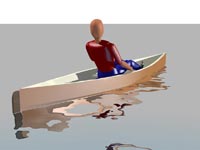
|
|
Everybody else gets to experience a fully self-draining
hull without touching a bailing scoop. If you happen
to fall out of the boat, all you have to do is roll
yourself back over the side and into the hull and
all the water will quietly drain away while you pull
yourself together in the rapidly drying hull.
There are three frame style bulkheads under the inner
hull surface to handle the loads and provide unique,
self-contained buoyancy chambers. Access to the interior
is via three 8” waterproof deck plates, so that
interior volume can be used for light gear storage.
An enterprising builder could also create a series
of walled-off boxes in the sidewalls with netting
to secure the stuff that one might need on a more
regular basis.
I see this boat being used by fishermen, bird watchers,
swamp explorers, duck hunters, and just plain old
outdoors people who want a small, easy to use boat
that will go on the roof of their car with ease.
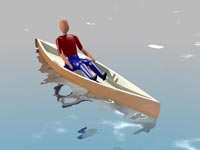 |
I see
this boat being used by fishermen, bird
watchers, swamp explorers, duck hunters,
and just plain old outdoors people who
want a small, easy to use boat that will
go on the roof of their car with ease.
|
|
Mirage propulsion is nearly effortless and it allows
a hands free means of getting around so that you can
take pictures eat a sandwich, have a beer, etc., without
stopping the boat. Steering is controlled by a simple
handle on the hull that connects to the flip-up rudder
via a stainless cable through the hull interior. Easy
to rig, virtually maintenance free each season and
simple to replace if the need arises.
This is a fun boat to build, own and lend-out to
lazy friends who should be building one for themselves
and not trying to borrow yours all the time.
Have at it folks, full size template plans will soon
be available here at these Duckworks pages for $85.
Chris Ostlind
Lunada Design
Chris@Wedgesail.com

Articles by Chris Ostlind:
|